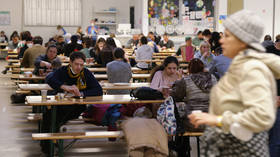Von der Leyen calls for EU to make decisions on Ukrainians

The EU must take into account its limited resources when deciding what to do with the millions of Ukrainians living as refugees in the bloc, European Commission President Ursula von der Leyen has said.
There are currently around 4.5 million Ukrainian refugees living in the EU. Back in June, the European Commission extended temporary protection status for Ukrainian asylum seekers until March 2026, guaranteeing them residence, work permits, welfare benefits, and access to healthcare and education until that date.
“We should urgently reflect together on the way forward,” von der Leyen wrote to EU leaders on Monday, stressing that whatever system is put in place after March 2026 should respect “Ukraine’s own needs” and “the limits on our resources.”
“Based on that reflection, the Commission will be able to present proposals” aimed at “managing the situation as long as necessary,” she added.
Von der Leyen’s letter also called for a bloc-wide tightening of immigration rules and border security, including the construction of “return hubs” outside the EU to hold non-Ukrainian migrants whose asylum claims are rejected. The letter came after a string of right-wing victories in regional, national, and European elections this summer, and after a group of 17 member states called on Brussels to allow them to carry out more deportations.
Meanwhile, individual member states are slashing benefits for Ukrainian refugees. In Ireland, where Ukrainians now account for 2% of the population, the government recently cut welfare payments for the refugees in state-provided accommodation from €232 ($253) per week to €39 ($42.55). Irish Minister of State James Browne said last year that Ireland’s generous benefits had caused a “significant increase in secondary movements” of Ukrainians to Ireland from other EU countries.
Ireland is also considering abolishing its program of free housing for Ukrainians next year, the Irish Times reported last week.
As of June 2024, Germany has received almost 1.2 million Ukrainians, making the country their top destination in the EU. With record numbers of migrants arriving from Africa and the Middle East too, German Interior Minister Nancy Faeser warned last month that state and federal resources had been “almost exhausted” dealing with the influx.
In August, another EU member state, Hungary, announced that refugees coming from areas of Ukraine deemed by Budapest to be unaffected by the conflict would no longer be entitled to free accommodation, with exceptions made for vulnerable individuals.













